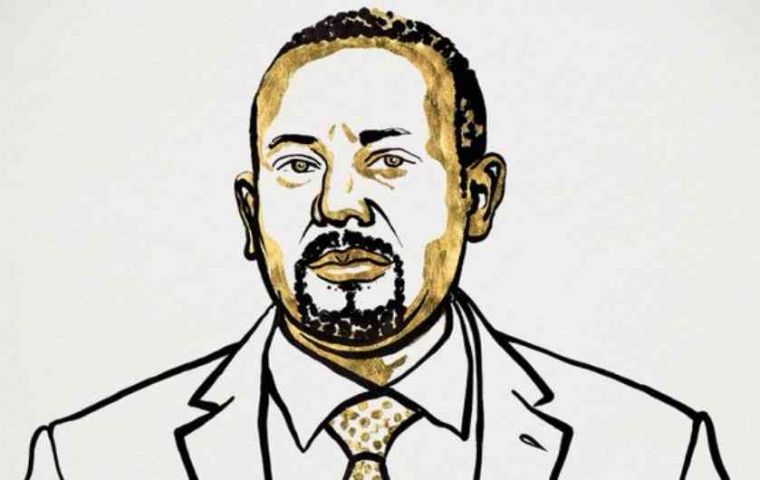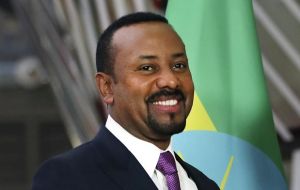MercoPress. South Atlantic News Agency
Nobel Peace Prize for Ethiopian prime minister who ended decades of hostility with neighboring Eritrea
 “We are proud as a nation,” the PM's office said, hailing a ”collective win for all Ethiopians, and a call to strengthen our resolve in making Ethiopia - the new horizon of hope - a prosperous nation
“We are proud as a nation,” the PM's office said, hailing a ”collective win for all Ethiopians, and a call to strengthen our resolve in making Ethiopia - the new horizon of hope - a prosperous nation  The Nobel Committee said Abiy had won the prestigious prize for ”efforts to achieve peace and international cooperation, and in particular for his decisive initiative to resolve the border conflict wi
The Nobel Committee said Abiy had won the prestigious prize for ”efforts to achieve peace and international cooperation, and in particular for his decisive initiative to resolve the border conflict wi Ethiopian Prime Minister Abiy Ahmed won the 2019 Nobel Peace Prize on Friday for his peacemaking efforts which ended two decades of hostility with longtime enemy Eritrea.
Though Africa's youngest leader still faces big challenges, he has in under two years in power begun political and economic reforms that promise a better life for many in impoverished Ethiopia and restored ties with Eritrea that had been frozen since a 1998-2000 border war.
“We are proud as a nation,” the prime minister's office said in a statement, hailing a “collective win for all Ethiopians, and a call to strengthen our resolve in making Ethiopia - the new horizon of hope - a prosperous nation for all.”
The Nobel Committee said Abiy had won the prestigious prize for “efforts to achieve peace and international cooperation, and in particular for his decisive initiative to resolve the border conflict with neighboring Eritrea.”
It said the prize was meant to recognize “all the stakeholders working for peace and reconciliation in Ethiopia and in the East and Northeast African regions.”
The Nobel Committee's decision appeared designed to encourage the peace process, echoing the 1994 peace prize shared by Israeli and Palestinian leaders and the 1993 award for moves towards reconciliation in South Africa, said Dan Smith, head of the Stockholm International Peace Research Institute.
“It is a case of wanting a constructive intervention in the peace process ... to give leverage and encouragement”.
“The challenge now is internal for Abiy Ahmed, with Ethiopia needing to deal with the consequences of long-term violence, including three million displaced people and the need for continuing the political process.”
Abiy had been bookmakers' second favorite to win, behind the teenage Swedish climate change campaigner Greta Thunberg.
Abiy, now 43, took office in April 2018 after the resignation of Hailemariam Desalegn following three years of street unrest.
From partial liberalization of the state-controlled economy to overhauling the security forces that had helped the ruling coalition maintain a tight grip on power since 1991, the promises have raised hopes in the country and abroad.
Abiy's landmark achievement to date is securing peace with neighboring Eritrea.
What remains to be seen is whether Abiy - who joined the Ethiopian army in his teens and rose through the ruling EPRDF coalition over the past two decades - can reshape Ethiopia and open it up to the world from within the current system.
Abiy also faces high expectations from young Ethiopians who want jobs, development, and opportunities.




Top Comments
Disclaimer & comment rulesCommenting for this story is now closed.
If you have a Facebook account, become a fan and comment on our Facebook Page!